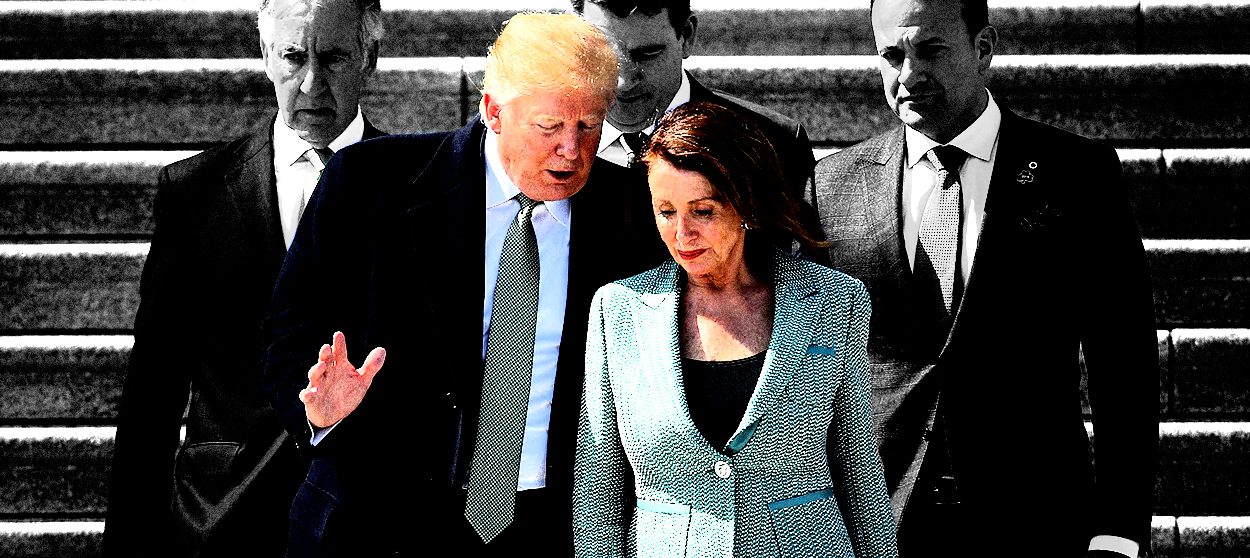How Pelosi lost her impeachment groove
Voters are souring on impeaching Trump — and Nancy Pelosi knows it


A free daily email with the biggest news stories of the day – and the best features from TheWeek.com
You are now subscribed
Your newsletter sign-up was successful
What happened to the impeachment efforts against President Trump? Did House Speaker Nancy Pelosi (D-Calif.) suddenly get cold feet? Or does she perhaps just have better political antennae than many of those in her caucus? The answer might tell us something about the 2020 election cycle.
The idea of impeaching Trump has played a key part in energizing Democratic activist circles. Billionaire climate-change activist Tom Steyer poured tens of millions of dollars into efforts to elect a Democratic majority in the House for that specific purpose. Pelosi and other Democratic leaders harnessed widespread disgust and anger toward Trump to turn out voters in 2018, winning back traditional "blue wall" states as well as spiking voter totals to record levels for a midterm. They succeeded in winning a House majority and in keeping losses in the Senate to a remarkably low level — and immediately began unfolding investigations designed to fuel impeachment.
Not for nothing does Trump complain about "presidential harassment," mainly on Twitter. The probes against him range in focus from the 2016 election to his use of executive power, from campaign finances to personal finances. The investigative effort being mounted by Pelosi's caucus may well be the broadest and most intrusive into a presidency since the case mounted against Bill Clinton, or likely even the Watergate scandal.
The Week
Escape your echo chamber. Get the facts behind the news, plus analysis from multiple perspectives.

Sign up for The Week's Free Newsletters
From our morning news briefing to a weekly Good News Newsletter, get the best of The Week delivered directly to your inbox.
From our morning news briefing to a weekly Good News Newsletter, get the best of The Week delivered directly to your inbox.
So with the machinery of impeachment jumping into high gear over the last few weeks, Pelosi surprised many observers when she appeared to categorically remove impeachment from the agenda in this session of Congress. "I'm not for impeachment," the speaker told The Washington Post last week. "I don't think we should go down that path, because it divides the country. And he's just not worth it."
That statement angered activists who saw the proliferation of House investigations as the logical precursor to an impeachment. Backbencher Democrats in Pelosi's caucus, such as Reps. Rashida Tlaib (D-Mich.) and Al Green (D-Texas), pledged to push forward with impeachment votes without her support, which would make them all but dead on arrival. Steyer rebuked her by asking: "Is holding the president accountable for his crimes and cover-ups 'worth it?' Is doing what's right 'worth it?'"
Perhaps even more surprisingly, Democratic leaders who stoked impeachment fever suddenly discovered a little skepticism of their own. House Intelligence Committee Chairman Adam Schiff (D-Calif.) had previously insisted that Special Counsel Robert Mueller would gift-wrap evidence of crimes that would lead directly to impeachment. Schiff reset expectations after Pelosi's comment, saying removal would be impossible "in the absence of very graphic evidence," which meant that "putting the country through a failed impeachment process isn't a good idea." House Judiciary Committee Chairman Jerrold Nadler (D-N.Y.) also appeared to get a chill under his feet. "If you do it," Nadler told Politico, "you don't [want to] have half the country saying for the next 30 years: We won the election, you stole it."
At first blush, it sounds as though Democrats have rethought matters in terms of the Clinton experience for Republicans. The GOP managed to impeach Clinton during his second term for perjury and obstruction of justice, but failed to remove him. Republicans who pushed impeachment only to fail to make the case for removal paid a heavy price in the next election. That backlash certainly should make Democrats skeptical of using that same playbook.
A free daily email with the biggest news stories of the day – and the best features from TheWeek.com
That may explain some of Pelosi's skepticism, but not all of it, and not the sudden brake-tapping from Schiff and Nadler. After all, those lessons have hardly faded from view, and the Republican salvaging of the Senate in 2018's midterms would have made all of those calculations obvious. So what's changed?
Perhaps Pelosi looked behind her and realized that the army of voters marching for impeachment turned out to be a lot smaller than she first thought. A Suffolk University/USA Today poll earlier this week got a lot of attention for one topline result showing a slim majority agreeing with Trump that the Mueller probe is a "witch hunt."
However, a more important result in the poll was mainly overlooked. Support for impeachment dropped 10 points since the election, with only 28 percent of all respondents in favor of its "serious consideration." Even among Democrats in the survey, only 53 percent support the idea. Among key demographics for Democrats such as women (32/57), Hispanics (39/50), and voters under 35 years of age (36/52), majorities outright oppose consideration of impeachment.
This is not the first polling series to detect a collapse in popularity for impeachment. On the heels of the Suffolk/USA Today poll, CNN released results of its latest survey, showing support for impeachment dropping seven points since December, from 43 percent to 36 percent. CNN's December poll had already shown a flip in support for impeachment. In January, the Washington Post/ABC poll showed a nine-point drop in support for the idea from a similar poll from before the midterms. The gap change was even more dramatic; it went from 49/46 in August 2018 to 40/55 five months later, a 15-point swing.
The lesson here? Impeachment may drive the activists, but it's leaving voters colder and colder as they get distance from the 2018 midterms. Pelosi may want to excuse the change in strategy by claiming that Senate Republicans wouldn't cooperate anyway, but the real problem is that Democrats are already losing the impeachment argument, and have been for months. Pelosi's smart enough to recognize it and spin it by dismissing Trump as "not worth it."
This should teach Democrats a lesson in their upcoming presidential primary, too. Thus far, candidates have pandered hard to the activist left in attempting to stake out their own ground in the crowded field. Even Joe Biden, who could own the moderate lane if he chooses to run, declared, "I have the most progressive record of … anybody who would run." John Hickenlooper, an entrepreneur who made a fortune by starting out in small business, ran away from capitalism in order to protect his flank from attacks by socialists.
Perhaps before the 2018 election, the hatred some voters had for Trump papered over distinct divisions within the opposition to his presidency. But the collapse in support for impeachment should have Democratic candidates rethinking their approach. The progressive agenda, especially in regard to Trump, might cut them off from the center of the electorate and hand Trump a win in 2020.
Edward Morrissey has been writing about politics since 2003 in his blog, Captain's Quarters, and now writes for HotAir.com. His columns have appeared in the Washington Post, the New York Post, The New York Sun, the Washington Times, and other newspapers. Morrissey has a daily Internet talk show on politics and culture at Hot Air. Since 2004, Morrissey has had a weekend talk radio show in the Minneapolis/St. Paul area and often fills in as a guest on Salem Radio Network's nationally-syndicated shows. He lives in the Twin Cities area of Minnesota with his wife, son and daughter-in-law, and his two granddaughters. Morrissey's new book, GOING RED, will be published by Crown Forum on April 5, 2016.
-
 6 of the world’s most accessible destinations
6 of the world’s most accessible destinationsThe Week Recommends Experience all of Berlin, Singapore and Sydney
-
 How the FCC’s ‘equal time’ rule works
How the FCC’s ‘equal time’ rule worksIn the Spotlight The law is at the heart of the Colbert-CBS conflict
-
 What is the endgame in the DHS shutdown?
What is the endgame in the DHS shutdown?Today’s Big Question Democrats want to rein in ICE’s immigration crackdown
-
 The billionaires’ wealth tax: a catastrophe for California?
The billionaires’ wealth tax: a catastrophe for California?Talking Point Peter Thiel and Larry Page preparing to change state residency
-
 Bari Weiss’ ‘60 Minutes’ scandal is about more than one report
Bari Weiss’ ‘60 Minutes’ scandal is about more than one reportIN THE SPOTLIGHT By blocking an approved segment on a controversial prison holding US deportees in El Salvador, the editor-in-chief of CBS News has become the main story
-
 What happens to a Democratic Party without Nancy Pelosi?
What happens to a Democratic Party without Nancy Pelosi?TODAY'S BIG QUESTION The storied former speaker of the House is set to retire, leaving congressional Democrats a complicated legacy and an uncertain future
-
 Has Zohran Mamdani shown the Democrats how to win again?
Has Zohran Mamdani shown the Democrats how to win again?Today’s Big Question New York City mayoral election touted as victory for left-wing populists but moderate centrist wins elsewhere present more complex path for Democratic Party
-
 Millions turn out for anti-Trump ‘No Kings’ rallies
Millions turn out for anti-Trump ‘No Kings’ ralliesSpeed Read An estimated 7 million people participated, 2 million more than at the first ‘No Kings’ protest in June
-
 Ghislaine Maxwell: angling for a Trump pardon
Ghislaine Maxwell: angling for a Trump pardonTalking Point Convicted sex trafficker's testimony could shed new light on president's links to Jeffrey Epstein
-
 The last words and final moments of 40 presidents
The last words and final moments of 40 presidentsThe Explainer Some are eloquent quotes worthy of the holders of the highest office in the nation, and others... aren't
-
 The JFK files: the truth at last?
The JFK files: the truth at last?In The Spotlight More than 64,000 previously classified documents relating the 1963 assassination of John F. Kennedy have been released by the Trump administration
